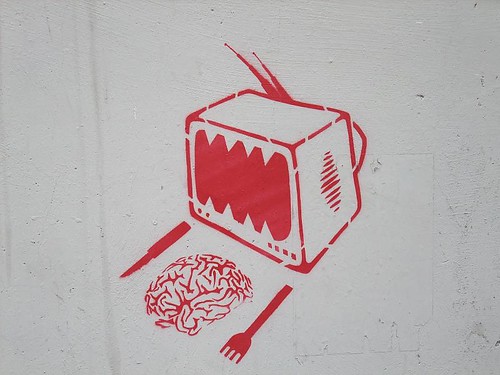Faculty Research: Randy Lewis' "The Compassion Manifesto"
The primary directive of AMS :: ATX is to provide a public showcase for research and work from various members of UT's American Studies department. Thus far, we've brought you interviews with faculty members, research updates, and announcements about the wonderful projects our colleagues have undertaken - but we haven't yet highlighted the more formal scholarly writing that academics typically do.Today, we bring you a brief excerpt of a piece by Dr. Randy Lewis from Flow, the online journal of the UT Radio-Television-Film department. He critiques the lack of visible compassion and charity on television, with references to such varied examples as The Wire, Oprah, and Louis C.K.
This is the first of three pieces he'll be writing for Flow this year, so check back here (and there, natch) to see more:
Think about it: when was the last time you saw an act of charity on TV? In the strictly for-profit world of corporate media that dominates our nightly viewing, caring for strangers has lost out to macho indifference, consumerist narcissism, and paranoid stranger-danger. Except in rare circumstances, we are not permitted to witness ongoing suffering nor those who tend to it. This omission is one of the defining facts of our contemporary mediascape.Let me be clear: I’m not talking about those periodic moments of telegenic ruin when Anderson Cooper choppers in for a few weeks of sober glances at the problem. I’m talking about the day-to-day shit through which people slog and activists struggle: unsafe water, inadequate food, abusive institutions, cruel economics, uncertain prospects, epic despair. Where do we bear witness to that pain in the age of the screen? When do we imagine ourselves in solidarity with those who suffer?
Definitely check out the full article here, and do comment with your thoughts on Dr. Lewis's argument - this is a discussion worth having in a virtual forum. A few questions to stoke the fires in your brain:Where else might we find compassion on TV, beyond Louie and Oprah and independent documentary? And is this ostensible dearth of charity really incubated primarily by corporate ownership and corporate directives? To what extent are we, as television consumers, also responsible, as we crave the 21st century freak show Jersey Shore and the gladiatorial match that is America's Got Talent with a primitive lust for blood? Why haven't we demanded better?
